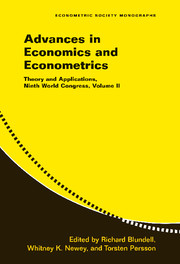Book contents
- Frontmatter
- Contents
- Contributors
- Introduction by the Editors
- Advances in Economics and Econometrics
- 1 Empirical Models of Auctions
- 2 Identification in Models of Oligopoly Entry
- 3 Empirical Models of Imperfect Competition: A Discussion
- 4 Recent Developments in the Economics of Price Discrimination
- 5 Bounded Rationality in Industrial Organization
- 6 Price Discrimination and Irrational Consumers: Discussion of Armstrong and Ellison
- 7 Behavioral Economics
- 8 Incentives and Self-Control
- 9 Discussion of “Behavioral Economics”
- 10 Dynamic Models for Policy Evaluation
- 11 Microeconometric Search-Matching Models and Matched Employer-Employee Data
- 12 Discussion of ‘Dynamic Models for Policy Evaluation’ and ‘Microeconometric Search-Matching Models and Matched Employer-Employee Data’
- 13 Field Experiments in Development Economics
- 14 Institutions and Development: A View from Below
- Index
- Titles in the series
6 - Price Discrimination and Irrational Consumers: Discussion of Armstrong and Ellison
Published online by Cambridge University Press: 05 January 2013
- Frontmatter
- Contents
- Contributors
- Introduction by the Editors
- Advances in Economics and Econometrics
- 1 Empirical Models of Auctions
- 2 Identification in Models of Oligopoly Entry
- 3 Empirical Models of Imperfect Competition: A Discussion
- 4 Recent Developments in the Economics of Price Discrimination
- 5 Bounded Rationality in Industrial Organization
- 6 Price Discrimination and Irrational Consumers: Discussion of Armstrong and Ellison
- 7 Behavioral Economics
- 8 Incentives and Self-Control
- 9 Discussion of “Behavioral Economics”
- 10 Dynamic Models for Policy Evaluation
- 11 Microeconometric Search-Matching Models and Matched Employer-Employee Data
- 12 Discussion of ‘Dynamic Models for Policy Evaluation’ and ‘Microeconometric Search-Matching Models and Matched Employer-Employee Data’
- 13 Field Experiments in Development Economics
- 14 Institutions and Development: A View from Below
- Index
- Titles in the series
Summary
OVERVIEW
I have the formidable task of commenting on two outstanding surveys of two important literatures. Armstrong (2005) examines developments in the theory of price discrimination, and Ellison (2005) examines the use of bounded rationality in industrial organization. Most of the recent work on price discrimination is concerned with oligopoly markets. The main issues in Armstrong's survey are: does competition eliminate price discrimination and, if not, what is the impact of a ban on price discrimination? General results on these questions are difficult to obtain. Thus, one of the roles of theory is to classify the kinds of oligopoly markets where price discrimination is likely to occur, the form that it is likely to take, and impact that it is likely to have on profits and welfare. Armstrong describes the progress that has been made on developing this taxonomy. I will highlight what I view are the main insights and make a couple of comments on outstanding issues.
The theme of firms exploiting consumers is also present in Ellison's survey, which focuses primarily on irrational consumers. However, the main issues are methodological. The rational game-theoretic approach has dominated theoretical and empirical work in IO for the past twenty years. Indeed, the literature on bounded rationality in IO is so sparse that Ellison's survey is in part a discussion of the potential of bounded rationality approaches for the field.
- Type
- Chapter
- Information
- Advances in Economics and EconometricsTheory and Applications, Ninth World Congress, pp. 175 - 180Publisher: Cambridge University PressPrint publication year: 2006

